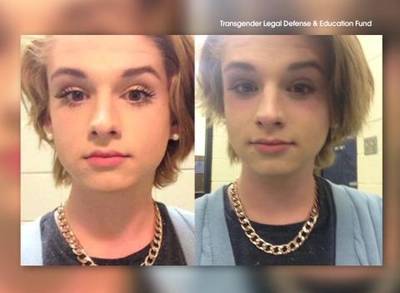Sociologists are interested in studying how our institutions—in addition to our ideologies and interactions—reflect social norms in ways that tend to reproduce the status quo. A great example happened recently in South Carolina. In this case, the institution is the Department of Motor Vehicles, the norm is that boys and men don’t wear make-up, and the case is Chase Culpepper, a male-bodied trans teen who wanted to wear make-up in her driver’s license photo.
The officials at the DMV told her that she wasn’t allowed to wear make-up in the photo because it would be a “disguise.” As reported by NPR:
The department … cited a 2009 rule that prohibited applicants from “purposely altering his or her appearance so that the photo would misrepresent his or her identity.”
They told Culpepper to take off her make-up or go home without a license. She did what they said. She shared these before and after photos with the Transgender Legal Defense and Education Fund, which shared them with the public.

It’s hard to defend the idea that somehow make-up distorts a man’s identity, but not a woman’s. It has exactly the same illusory power on a female face as a male one; that’s exactly why women wear it. The DMV’s policy did nothing, then, to help it do its job, it only served to press citizens of South Carolina to conform to the gender binary, at least as far as their primary form of identification went.
With the help of the Transgender Legal Defense and Education Fund, Culpepper sued and the DMV settled. As part of the settlement:
[They] agreed to change its policy to allow people seeking drivers’ licenses to be photographed as they regularly present themselves, even if their appearance does not match the officials’ expectations of how the applicant should look. The department also promised to send Culpepper a written apology and train its employees in how to treat transgender and gender-nonconforming individuals in professional settings.
This is what institutional change looks like, at least potentially. Thanks to Culpepper and her advocates, the South Carolina DMV is a little bit less gender binary than it was before.
This post originally appeared on Sociological Images, a Pacific Standard partner site, as “Trans Teen Takes on the DMV, Wins Right to Wear Make-Up.”




